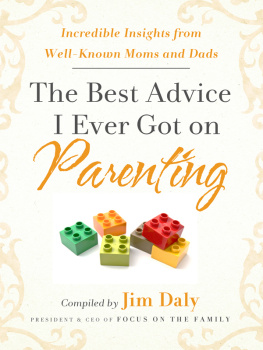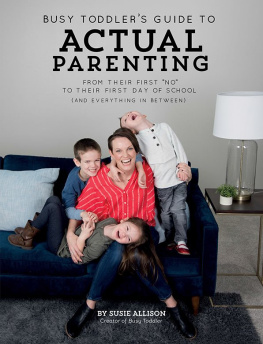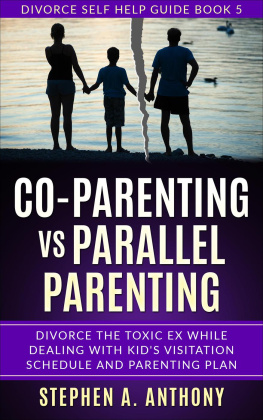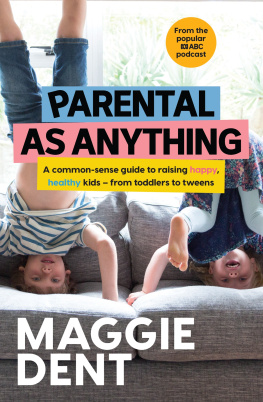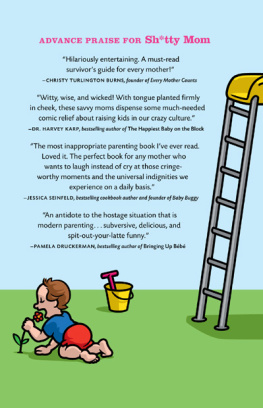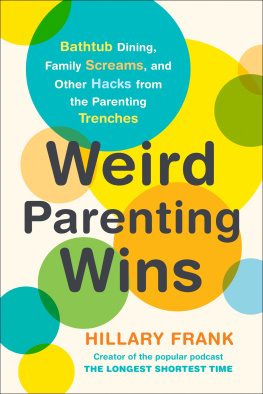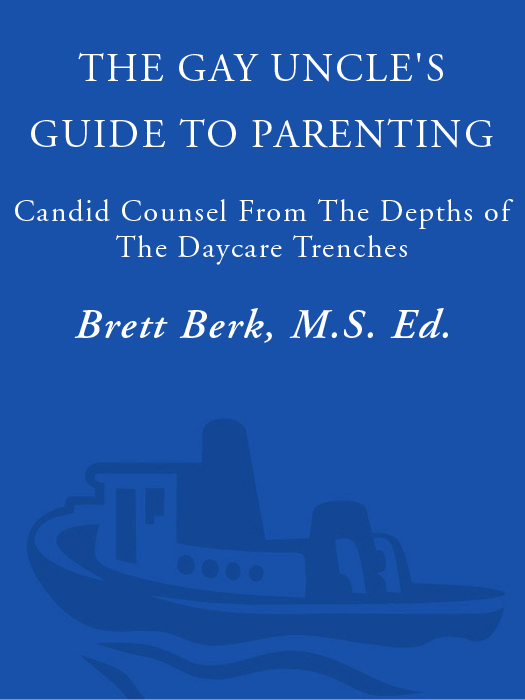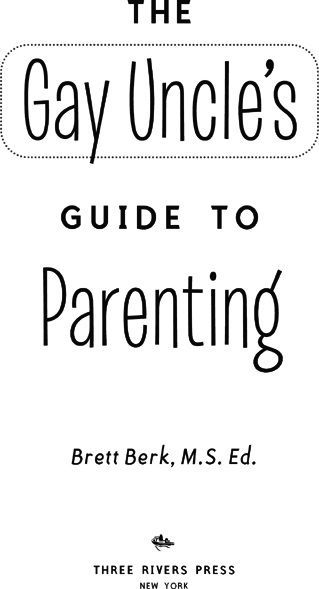For the children
Contents
Introduction
Parenting as Pinball
WHENEVER MY THREE siblings or I complain to our mother about some heinous practice she employed in our childhood, something that could loosely fall under the rubric of parentingforgetting to pick us up from Hebrew School; staying out until 1 a.m., riding the mechanical bull; simultaneously driving and whacking at whichever of us she could reach with a plastic spoon she kept in the glove boxher retort is always the same: You kids didnt come out with an instruction manual stapled to your foreheads.
Some pop-psychologizing would suggest that perhaps I got into working with young kids as a way of correcting for having grown up in a broken home. There may be some truth in this. Its certainly true that after my parents divorced, they both quickly abandoned the wee Berk four: Dad married a born-again Christian and renounced us; Mom worked twelve-hour days in sales and trolled the singles bars at night. Its also true that this arrangement left my younger sister and me with the task of raising our little brother, switching off caring for him like two teenage parents (albeit ones who never spoke).
Its also possible that I fell into the world of early childhood through an accident of economics. I was the only boy in the local babysitting pool, a fact that made me appealing to our neighborhoods growing cohort of divorced moms, all of whom wanted their kids to have some sort of male role model. Though I was hardly ideal as a dad substituteI hated sports, I couldnt grillI routinely made twenty-five cents an hour more than the girls. And being the only male applicant was an advantage that carried over when I finished college and started looking for paid work as a teacher. (The rate of pay remained unchanged as well.)
But after more than twenty years as an early childhood educator, Ive come to realize that I gathered all of this knowledge so that I could write the elusive book my mother was always talking about. (Note: do not staple this to your childs head.)
This book is not for parents who want to raise a perfect child. You can probably make that kind of kid, but I dont think you should. Ive met more than my share of young prodigieskids who were pushed to skip grades, memorize the Latin names for every insect, and greet all adults with firm handshakes. Theyre weird, and not in a good way, like a corgi wearing a tuxedo: sure its cute, but does it truly know joy? This book is for people who are tired of feeling pressured to have that kind of kid, who are fed up with having to hear about, or act on, every parenting trend that comes down the pike. This is a book for those of you who want to be parents as well as people, who dont want to feel guilty about taking some time for yourself or your relationship (if youre even in one). Its for those folks who might, every once in a while, want to get drunk, and have sloppy sex without worrying that theyre going to roll over on their kid because you all sleep in a family bed since thats how they do it in Taiwan and they have the highest math scores of any country on earth. This book is for parents whose gut instinct is telling them that its probably not any healthier or coolerfor anyone involvedfor them to be their childs best friend than it is to be their merciless overlord. This book is for parents who want to find a way to return a sense of balance to their life, and to the lives of their kids.
Wait, you say. Theres already plenty of information out there on this topic. In your most recent perusal of the parenting section on Amazon, youve seen a number of titles to this effect: Why Breast-Feeding Is Worthless, How to Unprogram Your Fetus, Why You Should Put Your Kids in Foster Care RIGHT THIS MINUTE and Go Back to Being the Big Drunken Slut You Once Were. Well, Im going to let you in on a little secret: those books are all flawed. Why? Because theyre all written by parents.
Now, I have to give parents their props. An incredible ego release is required in order to smother a child with the kind of blind unconditional love that is necessary to perform the job properly. In fact, it was seeing firsthandas a preschool teacherjust how difficult parenting is that convinced me that I was not cut out for it. But blind unconditional love, by definition, must contain some blind spots. My job in this book is to shine a light onto these. A bright light. A klieg light, actually. So, consider yourself warned. Im going to be snide. Im going to poke fun. Im going to call you out on all sorts of crap you didnt think anyone had noticed. But you have to remember, Im not doing this to be cruelor at least not only to be cruel. Im doing it because I love kids. (News flash: people dont work in preschools for the money.) Im charmed by their humanity. Im in awe of the way they piece together information. And Ive dedicated my entire adult life to creating means to help them succeed. But by not being overly invested in their every move, by not needing them to like me all the time, and by having attempted and borne witness to a wide range of profoundly unsuccessful strategies, Ive developed a unique perspective on how to raise them: Im an outside expert.
You might counter that much of my position is predicated on my ability to divest and even, at times, to walk away. You might say, You dont have to live with them. I would wholeheartedlyand thankfullyagree. But I would counter-counter that this doesnt inherently make my position any less valuable. (Not all dentists have cavities, and not all plastic surgeons have face-lifts.) In fact, it might actually enrich my perspective. Havent you learned that distancing yourself from dramaespecially family dramacan be an extremely useful tool? If not, perhaps you should meet my mother. (On second thought, maybe you should just try it on your own.) Moreover, there seems to be a national trend that favors entrusting the satisfaction of our most personal human needs to gay men. Americans have already ceded to us the right to clothe, style, groom, and feed themand to good effectso it seems logical that there should be room in the world of child rearing for the kind of bitchy yet benevolent role played by your hairdresser or interior decorator: someone fully invested in your needs but holding their own perspective; someone who can offhandedly throw together things you never imagined could be combined; and someone who can seduce you with highly functional concepts that you suspect wont work, but you actually find totally liberating. Voil: The Gay Uncles Guide to Parenting (GUG).
Using humorous anecdotes from my life with my family and friends, from my experience as a teacher and preschool director, and from my work as a consultant to some of the worlds biggest producers of kids media, food, and toys, this book will examine the dilemmas of modern parenthood and elucidate the jobs most important rules. Funny little charts, checklists, and tables will supplement these tales, and help you learn how to zoom out of the PARENTING BUBBLE , and see your lifeand your kidwith fresh eyes.
A PARENTING BUBBLE , I hear you say. What the hell is that? Well, Im glad you asked, because its a key feature of this book. A PARENTING BUBBLE is the external manifestation of a degenerative psychological condition, one that is brought on by living with a child full time and/or spending your time solely in the company of people who live with a child. The most common symptom is an inability to maintain perspective on your own actions. Those afflicted start to claim all sorts of crazy things: that primary colors are acceptable in decor, that Jell-O is fun, that baby poop doesnt stink. If a case becomes profound, the infected may even ask their friends to


